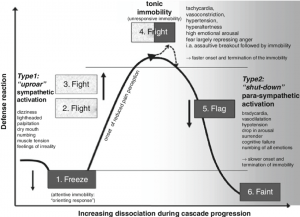When you can’t fight or flee: COVID-19 and trauma
This year has been tough. Wildfires, social and political unrest, lockdowns, and enormous loss of life… it’s difficult to know where to begin with processing everything that has happened in 2020, and it’s not even over yet. The reality is, our nation and the world are going through numerous traumatic events all at once, and we are all feeling some level of impact from that. It would be disingenuous for me to try to sit here and say that I have a solution to help you escape it all. I don’t. People don’t and can’t exist in a vacuum, and neither does our mental health.
What I can say is that there are some things that we know about who copes better with traumatic events, and at least some of it has to do with a very ancient mechanism: the Fight, Flight, Freeze response. Let’s take a look at this response, what it tells us about how people are reacting to the traumas of 2020, and what we can do to help reduce the impact of it all.
So for starters, what is Fight, Flight, Freeze? In a nutshell, it is a set of physiologic reactions to a threatening situation which are designed to help us escape safely. When activated, it motivates us to either attack the threat if there is reason to believe we can overpower it, run from it if we might be able to outrun it, or if neither option is available, we might remain motionless or even appear to faint/fall asleep. This last option may seem strange, like giving up, but for early humans, this mechanism could be life saving. Many predators either can’t easily detect prey that is immobile, or may suspect that something is wrong with their prey because and therefore avoid it. And in the worst case scenario, falling asleep serves as a psychological protection from the pain of dying.

For the most part, we don’t really have much control over how our bodies initially respond to threats. You may find that you experience only one of these responses, or each of them in alternating waves. People who experience “fight” may feel irritable, restless, and prone to lashing out at others. People who tend more towards “flee” will feel anxious, jittery, and spend a lot of time worrying. For people who tend to “freeze/fall” asleep, they may feel helpless, struggle with motivation, space out a lot, and feel unusually tired. Although we don’t get to choose, what we do with these responses is important.
We know that trauma tends to occur when we are unable to take action in the face of a threatening situation. That Fight, Flight, Freeze response holds an enormous amount of energy. When that energy has nowhere to go, it builds up in our system and can lead to symptoms of Post Traumatic Stress Disorder down the line. (See “Waking the Tiger: Healing Trauma” by Peter Levine, or “The Body Keeps the Score: Brain, Mind, and Body in the Healing of Trauma” by Bessel Van Der Kolk for more on this). But people who are able to take action, particularly successful action, in the face of threatening events get rid of this energy and tend to do much better.
What does this look like in modern day life? Well, if you were at the Boston Marathon Bombing several years ago and you were able to run away from the scene without injury, that would be an example of successful action in the face of threat. In more ordinary life, a threat could be much less obvious, but usually anything that makes us feel anxious or angry. Successful action could look like successfully meeting an important deadline at work, finally going to that doctor appointment that you’ve been avoiding, or writing to your state representatives about an issue that affects your family and getting a response.
So what do we do when the threat isn’t something we can easily fight or run from it, like COVID-19? My best answer is, try to do something. Take charge of whatever you can, and if you can take charge of something directly related to the pandemic, that will be even better. If you can’t, make sure it’s something that burns up some of that Fight or Flight energy. We are all going to be limited by certain factors like time, financial resources, and our level of support. We can’t all discover the cure for coronavirus or make a vaccine. But we can all take small, daily or weekly actions that can help protect us from the impact of this trauma. Some ideas are:
-Stretch
-Go for a walk/jog/run
-Sew/donate masks
-Volunteer at an organization providing support to people affected by COVID illness, unemployment, or other consequences of the pandemic
-Make cards for hospital and nursing home patients and staff
-Clean/organize your home
-Make art
-Dance it out
-Hold a bake sale and donate your proceeds to charity
If you tend towards the Freeze response and are having a hard time getting things done, understand that this is nothing to be ashamed of – it’s just biology. However, it does put you at more risk of trauma. If you can, set small daily goals that involve moving your body, even if it is for a few minutes a day. And if you are struggling with trauma, whether it’s from something that happened in 2020 or earlier in life, we can help. Give us a call!